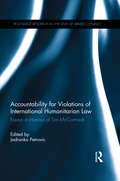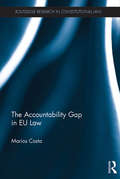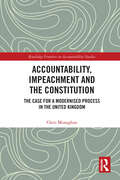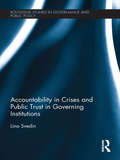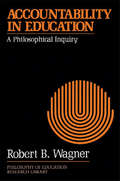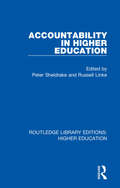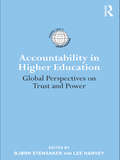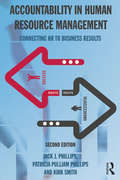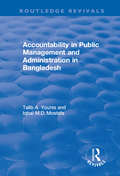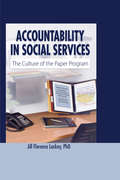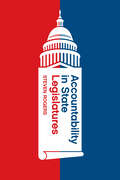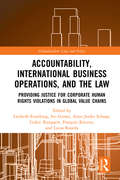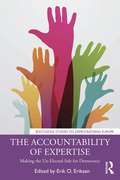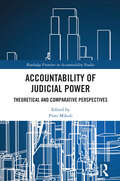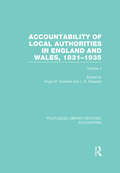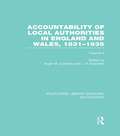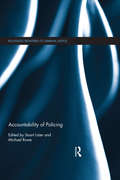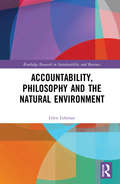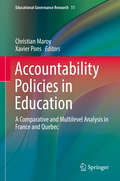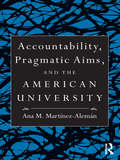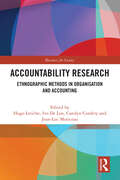- Table View
- List View
Accountability for Violations of International Humanitarian Law: Essays in Honour of Tim McCormack (Routledge Research in the Law of Armed Conflict)
by Jadranka PetrovicInternational criminal adjudication, together with the prosecution and appropriate punishment of offenders at a national level, remains the most effective means of enforcing International Humanitarian Law. This book considers the various issues emanating from present-day breaches of norms of International Humanitarian Law (IHL) and the question of how impunity for such breaches can be tackled. Honouring the work of Timothy McCormack, Professor of International Law at the University of Melbourne and a world renowned expert on IHL and International Criminal Law, contributors of the book explore the interplay between the rules governing accountability for violations of IHL and other areas of law that impact the prosecution of war crimes, including international criminal law, human rights law, arms control law, constitutional law and national criminal law. In providing a contemporary consideration of the various issues emerging from present-day breaches of norms of IHL, especially in light of growing interest in ‘fragmentation’ and ‘normative pluralism’, this book will be of great use and interest to students and researchers in public international law, international law, and conflict studies.
The Accountability Gap in EU law: Mind the Gap (Routledge Research in Constitutional Law)
by Marios CostaAlmost two decades ago, the fall of the Santer Commission against a background of allegations of maladministration and nepotism had the effect of placing accountability on the political agenda of the EU institutions. More recently, the non-ratification of the Constitutional Treaty, the difficulties of the ratification of the Lisbon Treaty and the current financial crisis have increased the calls for accountability in the EU. This book investigates whether any progress towards more accountability and transparency has been made in the post-Lisbon era by taking a holistic approach to the subject. Marios Costa argues that currently the EU institutions and the Member States are not in a position to hold the so-called independent agencies as well as the various committees and expert groups accountable. Despite recent progress, the EU still needs to put forward an acceptable constitutional framework which will truly secure accountability at the EU level of governance.
Accountability, Impeachment and the Constitution: The Case for a Modernised Process in the United Kingdom (Routledge Frontiers in Accountability Studies)
by Chris MonaghanThis book sets out and explores the case for a modernised impeachment process for the United Kingdom. The work examines the present law and history of impeachment in the United Kingdom, which today is widely regarded as having fallen into desuetude and its procedures inappropriate for modern conditions. It discusses how impeachment operates in two countries, the United States and Denmark, selected respectively for their marked differences from and similarities to the United Kingdom’s political and constitutional system, for the purposes of illumination and possible lessons for a new impeachment process. The book seeks to provide a balanced and independent examination of the case for this, concluding that it would have a valuable role to play in the future development of the United Kingdom’s system of politics and government. It concludes by setting out a detailed model for the structure, working and effect of impeachment. The book will be of interest to students, academics and policy-makers working in the areas of constitutional law and politics.
Accountability in American Higher Education
by Kevin Carey Mark SchneiderIn Accountability in American Higher Education prominent academics, entrepreneurs, and journalists assess the obstacles to, and potential opportunities for, accountability in higher education in America. Providing analysis that can be used to engage institutions of higher education in the difficult but necessary conversation of accountability.
Accountability in Crises and Public Trust in Governing Institutions (Routledge Studies in Governance and Public Policy)
by Lina SvedinThis book examines how efforts to exert accountability in crises affect public trust in governing institutions. Using Sweden as the case study, this book provides a framework to analyse accountability in crises and looks at how this affects trust in government. Crises test the fabric of governing institutions. Threatening core societal values, they force elected officials and public servants to make consequential decisions under pressure and uncertainty. Public trust in governing institutions is intrinsically linked to the ability to hold decision-makers accountable for the crucial decisions they make. The book presents empirical evidence from examination of the general bases for accountability in public administration, and at the accountability mechanisms of specific administrative systems, before focusing on longer term policy changes. The author finds that within the complex web of bureaucratic and political moves democratic processes have been undermined across time contributing to misplaced and declining trust in governing institutions. Accountability in Crises and Public Trust in Governing Institutions will be of interest to students, scholars and practitioners of public policy, political leadership and governance.
Accountability in Education: A Philosophical Inquiry (Philosophy of Education Research Library)
by Robert B. WagnerAccountability in Education discusses the debate surrounding the accountability of teachers and questions the responsibility that parents, other groups and even children themselves have for their experience at school. In this book, Robert Wagner examines the assumptions underlying criticisms of major institutions for their lack of attention to the ethical and practical ramifications of their policies. Wagner questions the validity of this assumption by analyzing accountability relationships in schools, discussing the responsibility students have for the quality of their own experiences--as well as the potential accountability of parents and other groups--and relating the issue of accountability in education to questions of moral and legal obligation in areas such as business, government and law. His book provides a cogent philosophical analysis of accountability and is invaluable to an understanding of a majour issue in the contemporary discussion of education.
Accountability in Higher Education (Routledge Library Editions: Higher Education #28)
by Peter Sheldrake, Russell LinkeOriginally published in 1979 Accountability in Higher Education contains the first comprehensive analysis of accountability in Australian higher education. The contributors systematically examine organisation and practice in the Australian higher education system, major issues relating to the accountability movement, and possible future developments arising from these issues. The authors look in turn at the various levels of organisation and accountability within the higher education system – Federal, State, sector, institution and individual – and in so doing provide the most comprehensive coverage possible of the major issues of concern. The book provides a detailed analysis that will be of particular interest to teachers, administrators and educational researchers.
Accountability in Higher Education: Global Perspectives on Trust and Power (International Studies in Higher Education)
by Bjørn StensakerThe latest volume in the Routledge International Studies in Higher Education series, Accountability in Higher Education takes an in-depth look at accountability initiatives around the world. Various evaluations, reporting schemes, and indicator systems have been initiated both to inform the public about higher education performance and to help transform universities and colleges and improve their functioning. This edited collection provides a comparative analysis of the promises, perils and paradoxes of accountability, and the potential effect on power structures and higher education autonomy, trust and the legitimacy of the sector. Part I describes how accountability is perceived and understood in different regions of the world, identifies some of the most common elements in established accountability initiatives, especially related to quality assurance, and provides direction for possible future development. Part II focuses on responses to new demands for accountability at institutional, national and international levels, and provides practical guidance for handling accountability going forward, emphasizing the dynamic relationship between international development, government strategies and organizational change. This volume is a must-have resource for HE managers, administrators, policy makers, researchers, HE graduate students and those interested or involved with HE accountability practices.
Accountability in Human Resource Management: Connecting HR to Business Results (Improving Human Performance Ser.)
by Jack J. Phillips Patricia Pulliam Phillips Kirk SmithFrom selection and assessment, to training and development, and reward management, all HR functions have an impact on an organization. Ever-present budgetary pressures mean that there is perpetual competition for resources, so HR departments must be able to account for and justify their contribution to the bottom line. This practical text presents a results-based approach to HR accountability, which explains how to: Uncover and monitor the costs of HR programs Develop programs emphasizing accountability Collect data for evaluation Measure the contribution of human resources Calculate HR’s return on investment This new edition is fully revised and updated to reflect developments in the field, such as the rise of talent management and the increased role of technology in HR measurement, and is supported with international examples throughout. New chapters have been added to address business alignment, HR scorecards, analytics maturity, and international applications of the methodology. Case studies, tool templates and lecture slides are provided as online supplements for HR practitioners and students. Accountability in Human Resource Management 2nd Edition is a complete and detailed guide suitable for HR professionals and students on advanced human resource management courses.
Accountability in Public Management and Administration in Bangladesh
by Talib A. Younis Iqbal Md. MostafaThis title was first published in 2000: This timely volume makes a valuable contribution to our understanding of the issues faced by developing countries embarking on the path of democracy and economic development. Accountability in public management and administration is an essential element in the decision making process. It provides a comprehensive study of public institutions and their management in a developing context.
Accountability in Public Policy Partnerships
by Julia SteetsA PDF version of this book is available for free in open access via the OAPEN Library platform, www. oapen. org . This book presents a new model of accountability which ensures that public-private partnerships don't erode public accountability. It defines concrete accountability standards for different types of partnerships.
Accountability in Social Services: The Culture of the Paper Program (Haworth Health and Social Policy Series)
by Jill Florence LackeyAccountability in Social Services examines how - and why - social and human services programs can function even though they are monitored by written communication instead of face-to-face interaction. Author Jill Florence Lackey draws on her experience as a consultant for more than 50 social programs and as director of two nonprofit organizations to demonstrate the strong need for accountability mechanisms and an ethics-based leadership when running social service programs. This unique book walks you through the process of how “paper programs” emerge and operate, the monitoring mechanisms that are - and aren’t - in place during program operations, and recommendations to increase accountability in the social service delivery system.The book examines programs focusing on: youth aftercare adolescent health drug prevention rural community development crime prevention violence intervention services to the homeless and more.Accountability in Social Services concludes with recommendations for organized action by consumer groups to increase responsibility in the social service delivery system. This book is invaluable as a resource for students, teachers, and practitioners working in social work and welfare, evaluation, organizational leadership, public policy, applied anthropology, and consumer science, including local organizations such as PIRGs (Public Interest Research Groups).
Accountability in State Legislatures (Chicago Studies in American Politics)
by Steven RogersA troubling portrait of democracy in US state legislatures. State legislatures hold tremendous authority over key facets of our lives, ranging from healthcare to marriage to immigration policy. In theory, elections create incentives for state legislators to produce good policies. But do they? Drawing on wide-ranging quantitative and qualitative evidence, Steven Rogers offers the most comprehensive assessment of this question to date, testing different potential mechanisms of accountability. His findings are sobering: almost ninety percent of American voters do not know who their state legislator is; over one-third of incumbent legislators run unchallenged in both primary and general elections; and election outcomes have little relationship with legislators’ own behavior. Rogers’s analysis of state legislatures highlights the costs of our highly nationalized politics, challenging theories of democratic accountability and providing a troubling picture of democracy in the states.
Accountability, International Business Operations and the Law: Providing Justice for Corporate Human Rights Violations in Global Value Chains (Globalization: Law and Policy)
by Liesbeth Enneking Ivo Giesen Anne-Jetske Schaap Cedric Ryngaert François Kristen Lucas RoordaA consensus has emerged that corporations have societal and environmental responsibilities when operating transnationally. However, how exactly corporations can be held legally accountable for their transgressions, if at all, is less clear. This volume inquires how regulatory tools stemming from international law, public law, and private law may or may not be used for transnational corporate accountability purposes. Attention is devoted to applicable standards of liability, institutional and jurisdictional issues, and practical challenges, with a focus on ways to improve the existing legal status quo. In addition, there is consideration of the extent to which non-legal regulatory instruments may complement or provide more viable alternatives to these legal mechanisms. The book combines legaldoctrinal approaches with comparative, interdisciplinary, and policy insights with the dual aim of furthering the legal scholarly debate on these issues and enabling higher quality decision-making by policymakers seeking to implement regulatory measures that enhance corporate accountability in this context. Through its study of contemporary developments in legislation and case law, it provides a timely and important contribution to the scholarly and sociopolitical debate in the fastevolving field of international corporate social responsibility and accountability.
The Accountability of Expertise: Making the Un-Elected Safe for Democracy (Routledge Studies on Democratising Europe)
by Erik O. EriksenBased on in-depth studies of the relationship between expertise and democracy in Europe, this book presents a new approach to how the un-elected can be made safe for democracy. It addresses the challenge of reconciling modern governments’ need for knowledge with the demand for democratic legitimacy. Knowledge-based decision-making is indispensable to modern democracies. This book establishes a public reason model of legitimacy and clarifies the conditions under which unelected bodies can be deemed legitimate as they are called upon to handle pandemics, financial crises, climate change and migration flows. Expert bodies are seeking neither re-election nor popularity, they can speak truth to power as well as to the citizenry at large. They are unelected, yet they wield power. How could they possibly be legitimate? This book is of key interest to scholars and students of democracy, governance, and more broadly to political and administrative science as well as the Science Technology Studies (STS).
The Accountability of Financial Sector Supervisors: Principles and Practice
by Eva Hüpkes Marc Quintyn Michael W. TaylorThe Accountability of Financial Sector Supervisors: Principles and Practice
Accountability of Judicial Power: Theoretical and Comparative Perspectives (Routledge Frontiers in Accountability Studies)
by Piotr MikuliThis book brings together a group of international scholars to discuss theoretical and comparative considerations of judicial accountability. Accountability of the judiciary is an essential element in a democratic state ruled by law. Its design must take into account the need to ensure both the legitimacy of the judiciary and its independence. The work discusses accountability in the light of recent research, including studies on the crisis of the rule of law in the contemporary world. The book adopts a broad approach to accountability, which has various facets, referring both to the courts, that is the organisational element of the judicial branch of government, and to judges, its individual dimension. It is divided into four parts: the first deals with the essence of the concept of accountability of the judiciary; the second discusses the emerging standards relating primarily to the individual accountability of judges; and the third discusses the position of constitutional judges through the lens of accountability. The fourth and final part provides a detailed consideration of the specific accountability mechanisms. The book will be a valuable resource for academics, researchers, and policymakers working in the areas of constitutional law and politics, and accountability studies.
Accountability of Local Authorities in England and Wales, 1831-1935 Volume 1 (Routledge Library Editions: Accounting)
by Hugh M. Coombs J. R. EdwardsThese books make available material relating to the statutory regulations covering the degree of accountability required from local authorities during the period 1834-1936. The bulk of historical accounting research has focused on the development of financial accounting although in recent years the development of management accounting has attracted more interest. In both these areas, it has been the accounting practices of the private sector which have received more attention, central government in the Middle Ages some attention, and local government accounting very little. These volumes redress this imbalance in historical investigation, both to provide a comparative basis for work on the private sector and to provide an historical perspective for the system of local government accounting currently in use.
Accountability of Local Authorities in England and Wales, 1831-1935 Volume 2 (Routledge Library Editions: Accounting)
by Hugh M. Coombs J. R. EdwardsThese books make available material relating to the statutory regulations covering the degree of accountability required from local authorities during the period 1834-1936. The bulk of historical accounting research has focused on the development of financial accounting although in recent years the development of management accounting has attracted more interest. In both these areas, it has been the accounting practices of the private sector which have received more attention, central government in the Middle Ages some attention, and local government accounting very little. These volumes redress this imbalance in historical investigation, both to provide a comparative basis for work on the private sector and to provide an historical perspective for the system of local government accounting currently in use.
Accountability of Policing (Routledge Frontiers of Criminal Justice)
by Michael Rowe Stuart ListerAccountability of Policing provides a contemporary and wide-ranging examination of the accountability and governance of ‘police’ and ‘policing’. Debates about ‘who guards the guards’ are among the oldest and most protracted in the history of democracy, but over the last decade we have witnessed important changes in how policing and security agencies are governed, regulated and held to account. Against a backdrop of increasing complexity in the local, national and transnational landscapes of ‘policing’, political, legal, administrative and technological developments have served to alter regimes of accountability. The extent and pace of these changes raises a pressing need for ongoing academic research, analysis and debate. Bringing together contributions from a range of leading scholars, this book offers an authoritative and comprehensive analysis of the shifting themes of accountability within policing. The contributions explore questions of accountability across a range of dimensions, including those ‘individuals’ and ‘institutions’ responsible for its delivery, within and between the ‘public’ and ‘private’ sectors, and at ‘local’, ‘national’ and ‘transnational’ scales of jurisdiction. They also engage with the concept of ‘accountability’ in a broad sense, bringing to the surface the various meanings that have become associated with it and demonstrating how it is invoked and interpreted in different contexts. Accountability of Policing is essential reading for academics and students involved in the study of policing, criminal justice and criminology and will also be of great interest to practitioners and policymakers.
Accountability, Philosophy and the Natural Environment (Routledge Research in Sustainability and Business)
by Glen LehmanUsing a philosophical and interdisciplinary approach, this book looks at how accountability can provide solutions to our current environmental and global political problems. When a social system has external elements imposed upon it, or presented to it, political problems are likely to emerge. This book demonstrates that what is needed are connecting social elements with a natural affinity to bring people together despite their differences. This book is different from others in the field. It provides new insights by critiquing the extant understandings of accountability and expands the possibilities by building on Charles Taylor’s philosophies. Central to the argument of the book are perspectives on authenticity and expressivism which are found to provide a radical reworking of our understanding of being in the world, and a starting point for rethinking the way individuals and communities ought to be dealing politically with accountability and ecological crises. The argument builds to an accountability perspective that utilises work from interpretivism, liberalism, and postmodern theory. The book will be of interest to researchers in environmental philosophy, critical perspectives on accounting, corporate governance, corporate social reporting, and environmental accounting.
Accountability Policies in Education: A Comparative and Multilevel Analysis in France and Quebec (Educational Governance Research #11)
by Christian Maroy Xavier PonsThis book addresses current changes of education policies in a context of globalisation. It does so by focusing on the implementation of performance-based accountability policies in France and in Quebec (Canada). It questions the trajectory of these policies, their mediations and their instrumentation in various territories and schools through a theoretical framework which combines a North American neo-institutionalist approach with the perspective of the French sociologie de l’action publique. The book extends the current international literature on English-speaking experiences of hard accountability to research on “soft” accountability policies and proposes a deep investigation in two highly contrasted education systems. This investigation is multilevel and has led to field research both in schools, in intermediate authorities, and in central administrations for three years. The research presented in the book addresses the international literature on accountability in public administration and in education, the current transformations of governance in education, as well as the forms taken by the globalisation of education policies in countries differently exposed to international influences. The comparison highlights a convergent neo-statist trajectory of the performance-based accountability policy in the two countries, various forms of governance by results enacted at the local and meso level, and more intense impacts of these policies on schools and teacher’s practices in Quebec than in France.
Accountability, Pragmatic Aims, and the American University
by Ana M. Martínez-AlemánAccountability, Pragmatic Aims, and the American University frames the debates on teaching and learning accountability in Higher Education. By examining significant historic periods in Higher Education, Martínez-Alemán explores the present apprehension about accountability in today’s colleges and universities. Throughout the book’s chapters, Martínez-Alemán uses the pragmatic philosophy of John Dewey to enlighten current understandings of professional freedoms and she also discusses democratic imperatives in light of accountability obligations: the teaching of undergraduates, data and empirical research on college teaching and learning, and the institutional policies for graduate student and faculty teaching development. This book reveals the tensions between the democratic character of the university—qualities that may seem irreconcilable with accountability metrics—and the corporate or managerial economies of modern American universities. Higher Education faculty, administrators, public policy makers, and students enrolled in Higher Education Masters and PhD programs will find that this book informs their practice and will serve to contribute to the debates on accountability for years to come.
Accountability Reconsidered: Voters, Interests, and Information in US Policymaking
by Charles M. Cameron Brandice Canes-Wrone Sanford C. Gordon Gregory A. HuberThe last two decades have witnessed a substantial change in the media environment, growing polarization of the two dominant parties, and increasing inequality of wealth and income. These profound changes necessitate updating our understanding of political accountability. Accountability Reconsidered examines how political accountability functions in the US today given the dramatic changes in voting behavior, media, congressional dynamics, and relations between branches. With particular attention to policymaking, this volume uses original research to analyze micro-foundations of voter behavior, examining its implications for incentives and offering insight into the accountability relationships among voters, interest groups, legislators, and government bureaucracy. Combining contributions from leading experts who write about the political system synoptically with those who focus on specific elements, Accountability Reconsidered brings together distinct perspectives to focus on the effect of the informational environment on government officials, bridging up-to-date knowledge about accountability mechanisms with our overall understanding of political accountability.
Accountability Research: Ethnographic Methods in Organisation and Accounting (Business for Society)
by Hugo Letiche Jean-Luc Moriceau Ivo De Loo Carolyn CorderyThis book discusses (auto- )ethnographies of accountability, undertaken (in close collaboration) by a multinational group of accounting and organization theory researchers over a period of three years. The key assumption underlying the book is that accountability is inherently an identity- creating process where the study of account- making has to be done participatively, with radical openness to the one(s) being researched, as well as to their context. That openness we call ‘ethnography’. The values or assumptions inherent to the practices of account and identity-making, in a specific context, are what (auto- )ethnographies seek to describe and identify. These values and assumptions warrant critical, ethical reflection, and this is what the researchers presented here have tried to provide.The chapters in this book all are mini- studies of relatedness. The scale of examination is intimate; the reflections provided by the researchers are mainly methodological.This book is of interest to accounting and organization theory students and scholars who believe that accountability can fruitfully be studied through (auto-) ethnography. The book extends currently existing views on how accountability can be handled and discharged between researchers and their researched, when local, intimate settings are studied.
